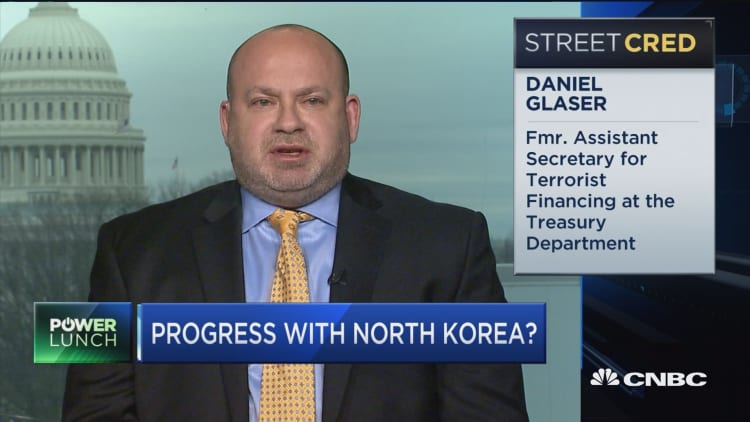
This is not the first time North Korea has said it would talk about ending its nuclear program, said Daniel Glaser, former assistant secretary for terrorist financing at the U.S. Department of the Treasury.
"We need to approach this with a level of sobriety that we've been down this road before," Glaser told CNBC during "Power Lunch" on Tuesday.
Glaser, now a principal with Financial Integrity Network, an advisory firm, said there have been "many times before over the past 25 years with North Korea where they've articulated a willingness to discuss and even abandon their nuclear program if they felt they didn't need it." The issue, he said, is that it would be "almost impossible" to persuade North Korea that it doesn't need its nuclear program for survival.
"They've always felt that they always need it," Glaser said. "And I don't think anything's changed with that."
Earlier Tuesday, North Korea said it was willing to hold talks with the United States over denuclearization and will suspend nuclear tests during the talks.
A spokesperson for the North said the country was willing to abandon its programs if the military threats against them are eliminated and the country's safety is guaranteed.
President Donald Trump tweeted Tuesday about the potential talks, calling it "possible progress" with the elusive nation.
Glaser agreed.
"I think it's better that [North Korea is] saying they're prepared to have talks than saying they're not prepared to have talks," he said, and pointed out that the Trump administration is continuing a long-standing strategy of increasing pressure on North Korea in the hopes that the country "will come to its senses" and be willing to sit down and discuss its nuclear program. The same strategy, Glaser said, was employed by the George W. Bush and Barack Obama administrations.
"We can't let up pressure," he said. "If we want any future talks to succeed, we may have to increase the pressure, even from what it's at now."
"I hope there's no one out there that is advocating for a reduction in pressure on North Korea simply for its willingness to engage in talks," Glaser said.
He added that talks need to include all countries that could possibly be affected, not just the U.S., "until it comes to a resolution of this issue that satisfies the international community."


